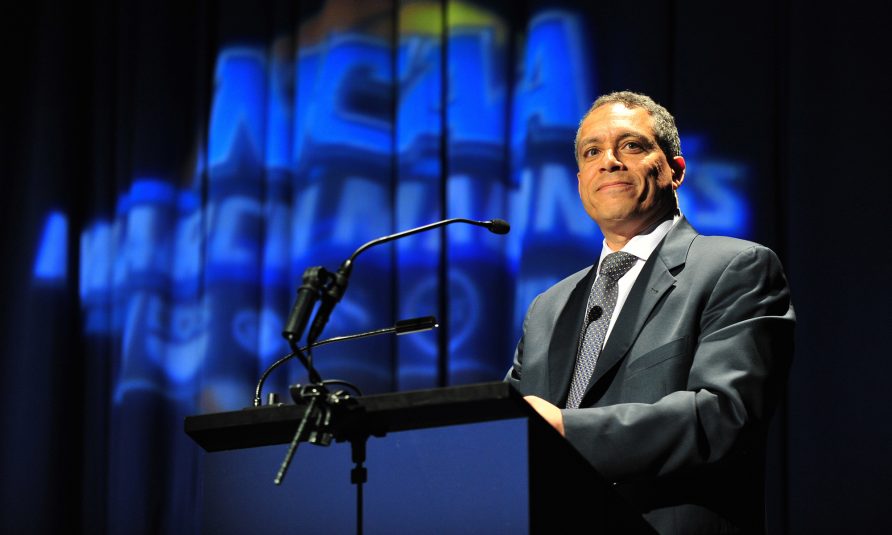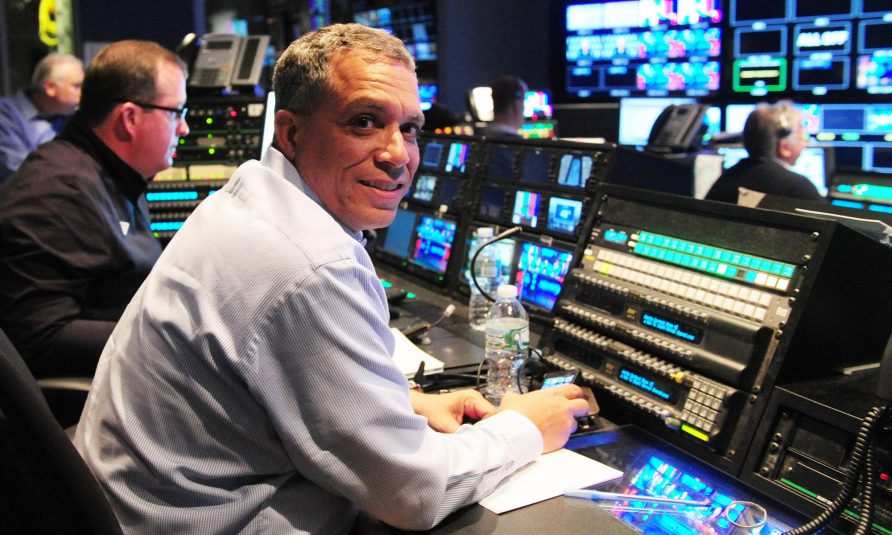Live From Final Four: CBS Sports Exec Harold Bryant Works His 20th Straight Final Four
Transitions to HD and digital mark the years for the accomplished producer
Story Highlights
No matter how successful we become, we always hope that we will never forget where we come from.
For Harold Bryant, executive producer/SVP, production for CBS Sports, that place is the corner of a truck tucked behind a curtain on the floor of San Antonio’s Alamodome in 1998. That year, Tubby Smith’s Kentucky Wildcats beat Utah to win the NCAA Men’s Basketball Tournament, and Bryant worked his first Final Four with CBS Sports, working in the tape area of the truck compound as an associate producer, putting together elements like highlights and teases for the broadcast.

From the 1998 NCAA Men’s Basketball Tournament to this weekend’s Final Four, producer Harold Bryant has seen numerous technological changes.
“I was in such awe of the event and to be a part of it and be there in the middle of it,” he says. “It was a special moment for me.”
To this day, the NCAA Men’s Basketball Tournament holds a special place in his heart, and as the CBS Sports exec enters the weekend set to work his 20th consecutive Final Four, he doesn’t know where the time has gone.
“Maybe this is more of a statement about life in general, but it’s been a blink of an eye,” says Bryant. “I try to chronicle my years through the tournament. It’s so consistent every year. Watching the tournament grow has been very special to be a part of. It continues to be a part of the fabric of the American lifestyle and sports culture.”
Early in his career with CBS Sports, Bryant was influenced and inspired by many iconic figures over the years, from his boss Sean McManus to producers Eric Mann and Bob Dekus and longtime director Bob Fishman. He also says he owes a lot to the support of the two men who held his position before him: Tony Pettiti (now COO at Major League Baseball) and Terry Ewart (today running his own independent production company).
“There are — and there were — so many great production people [at CBS Sports]. I looked up to several of them,” says Bryant. “I was just in awe of how [they] handled the cameras, the equipment, creating drama through pictures.”
Bryant is one of the most accomplished executives in the sports-television business. Since joining CBS Sports in 1997, he has catapulted through the ranks, serving in such roles as VP, production; EP; and VP, production. A 25-time Emmy Award winner, Bryant oversees all creative aspects of production and editorial content for CBS Sports and CBS Sports Network. He played a monumental role in the network’s coverage of Super Bowl 50, which ranks as the most-watched single broadcast in television history.
The Rutgers graduate got his start in 1987 working for WWOR-TV New York as a news and sports production assistant for New York Mets home games. His early career included stops as a production assistant for NBC Sports (1991-94); a features producer for Atlanta Olympic Broadcasting, host broadcaster for the 1996 Olympic Summer Games; and a studio producer for New York Knicks, New York Rangers, and New Jersey Devils games for WBIS-TV New York.

Bryant worked his first Final Four, in 1998, as an associate producer in the tape area of the production compound in San Antonio.
A lot has changed in the sports-video industry throughout Bryant’s career, the most notable to him being the move from standard definition to HD. At his first Final Four, the games were still broadcast in SD.
“[HD] was a ‘whoa’ moment,” he says. “It was like a whole new broadcast, and the world was opened up to us. That was a huge jump.”
He also notes that his network’s willingness to embrace high-speed–camera technology has been critical to the production’s growth and that the technology has “gotten so much better.”
The move from tape to digital has also been a major tectonic shift, in his eyes.
“We used to ship around hundreds and hundreds of tapes,” he recalls. “Now pretty much everything is digital, and we can call it up instantly. It’s taken us several years to transition, but, once we did, it was a new world for everyone. Whether they were in the edit room, in the truck, or in preproduction, it made life that much easier and allowed us to put a better product on the air.”
Perhaps the biggest change, though, came in 2011 when CBS opened up its agreement with the NCAA and welcomed Turner Sports as a full-fledged partner on the production and distribution of March Madness. Turner brought with it a wealth of talent behind the scenes and a cable-network footprint that allowed every game of the NCAA Tournament to receive distribution on a linear channel. The partnership between CBS and Turner is unlike anything seen in today’s hyper-competitive sports-media world.
“It’s been very fulfilling and enlightening [working with Turner Sports]. It keeps our group fresh and on our toes. We push each other. We challenge each other. We try to come up with the most creative ways to present the tournament and be engaging with the fans. It’s a fun experience and a growth experience. You don’t always get that if you do it the same way, on your own, every year. It’s nice to have that.”
At its core, however, Bryant believes that little has changed in the basics of covering the NCAA tournament, and, on the verge of putting his 20th Final Four under his belt, he doesn’t see that changing in the future.
“I love all of the different ways the tournament can be consumed today,” he says. “Whether it’s through digital or VR or isolated cameras or our Team Streams. All that is terrific. I do think the fundamental way that the Final Four has been covered, though, hasn’t changed all that much. The tournament, the Final Four, and the championship game is all about storytelling and building drama. The basics of the production are still there. We just have more tools, more methods, and more outlets to tell those stories. That will continue to stay the same; we’ll just continue to get in closer and tighter, going behind the scenes and getting different perspectives. We’ll just have more outlets to consume the tournament on.”
